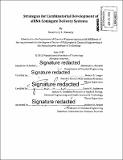Strategies for combinatorial development of siRNA conjugate delivery systems
Author(s)
Kanasty, Rosemary L
DownloadFull printable version (22.34Mb)
Other Contributors
Massachusetts Institute of Technology. Department of Chemistry.
Advisor
Robert S. Langer and Daniel G. Anderson.
Terms of use
Metadata
Show full item recordAbstract
RNA interference (RNAi), which can reversibly silence the expression of any gene, has vast potential as a therapeutic to treat many diseases. A wide variety of small interfering RNA (siRNA) delivery systems has been studied, including lipid nanoparticles (LNPs) and small molecule conjugates. LNPs are among the most potent and diverse nonviral delivery systems, and they have enjoyed continued improvement in efficacy as new generations of lipids have been explored. This steady progress in lipid performance has relied heavily on studies using combinatorial synthesis and high-throughput screening of large libraries to discover novel delivery materials. Conjugate delivery systems are attractive for their purity, well-defined structures, low ratios of delivery material to siRNA, and potentially broad therapeutic windows, yet relatively few efficacious conjugates are reported in the literature. As synthetic challenges prevent the study of large conjugate libraries, the development of conjugate systems has relied on individual synthesis of new materials. There is currently a need for new directions in the development of conjugate delivery systems, which demands methods to enable high-throughput screening of conjugate libraries. Here we present a viable synthetic strategy for creating combinatorial libraries of hundreds of siRNA conjugate delivery materials. We first demonstrate the synthesis of novel sequence-defined polymers that can incorporate a broad diversity of chemical properties relevant to delivery into oligomers with high purity. We develop methods of synthesis, purification, and siRNA conjugation that are translatable to high-throughput synthesis in multiwell plates. We then demonstrate the high-throughput capability of this method by synthesizing a library of over 500 novel siRNA conjugate materials. We explore applications of these novel conjugates as potential delivery materials in cell-based screens. We also develop strategies for conjugating materials to siRNA multivalently, which may improve delivery. This work enables the synthesis of hundreds of novel conjugate delivery materials in parallel. The study of these combinatorial libraries has the potential to open vast new avenues in the development of therapeutic siRNA conjugates.
Description
Thesis: Ph. D., Massachusetts Institute of Technology, Department of Chemistry, 2015. Cataloged from PDF version of thesis. Includes bibliographical references (pages 128-145).
Date issued
2015Department
Massachusetts Institute of Technology. Department of ChemistryPublisher
Massachusetts Institute of Technology
Keywords
Chemistry.